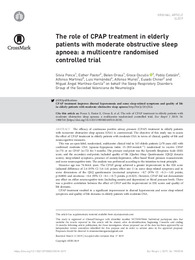Título :
The role of CPAP treatment in elderly patients with moderate obstructive sleep apnoea: a multicentre randomised controlled trial |
Autor :
Ponce, Silvia
Pastor, Esther
Orosa, Belén
Oscullo, Grace
Catalán, Pablo
Martinez, Alfonso
Hernandez Blasco, Luis M. 
Muriel, Alfonso 
Chiner, Eusebi 
Martínez-García, Miguel Ángel 
Sleep Respiratory Disorders Group of the Sociedad Valenciana de Neumología |
Editor :
European Respiratory Society |
Departamento:
Departamentos de la UMH::Medicina Clínica |
Fecha de publicación:
2019 |
URI :
https://hdl.handle.net/11000/34877 |
Resumen :
The efficacy of continuous positive airway pressure (CPAP) treatment in elderly patients with nonsevere obstructive sleep apnoea (OSA) is controversial. The objective of this study was to assess the effect of CPAP treatment in elderly patients with moderate OSA in terms of clinical, quality-of-life and neurocognitive measures.This was an open-label, randomised, multicentre clinical trial in 145 elderly patients (≥70 years old) with confirmed moderate OSA (apnoea-hypopnoea index 15-29.9 events·h-1) randomised to receive CPAP (n=73) or no CPAP (n=72) for 3 months. The primary end-point was the Epworth Sleepiness Scale (ESS) score, and the secondary end-points included quality of life (Quebec Sleep Questionnaire (QSQ) domain scores), sleep-related symptoms, presence of anxiety/depression, office-based blood pressure measurements and some neurocognitive tests. The analysis was performed according to the intention-to-treat principle.Mean±sd age was 74.9±4.6 years. The CPAP group achieved a greater improvement in the ESS score (adjusted difference of 2.6 (95% CI 3.6-1.6) points; effect size 1) in some sleep-related symptoms and in some dimensions of the QSQ questionnaire (nocturnal symptoms: -0.7 (95% CI -0.3--1.0) points; p<0.0001 and emotions: -0.4 (95% CI -0.1--0.7) points; p=0.023). However, CPAP did not demonstrate any effect on either neurocognitive tests (including anxiety and depression) or blood pressure levels. There was a positive correlation between the effect of CPAP and the improvement in ESS scores and quality of life domains.CPAP treatment resulted in a significant improvement in diurnal hypersomnia and some sleep-related symptoms and quality of life domains in elderly patients with moderate OSA.
|
Tipo de documento :
info:eu-repo/semantics/article |
Derechos de acceso:
info:eu-repo/semantics/openAccess
Attribution-NonCommercial-NoDerivatives 4.0 Internacional |
DOI :
10.1183/13993003.00518-2019 |
Publicado en:
European Respiratory Journal. 2019 Aug 22;54(2):1900518 |
Aparece en las colecciones:
Artículos Medicina Clínica
|

 La licencia se describe como: Atribución-NonComercial-NoDerivada 4.0 Internacional.
La licencia se describe como: Atribución-NonComercial-NoDerivada 4.0 Internacional.
.png)